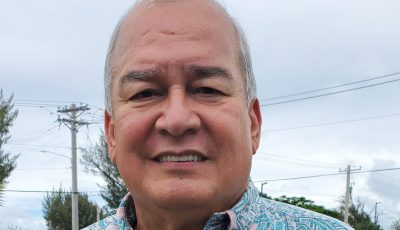CUC board members sued
Former Commonwealth Utilities Corp. public information officer Brad Ruszala and former CUC chief financial officer Matthew Yaquinto filed a lawsuit yesterday against CUC board members for allegedly holding closed-door meetings under the guise of “executive sessions” and using their positions to obtain private financial gain for themselves and their relatives.
Ruszala and Yaquinto, through George Lloyd Hasselback, are suing CUC board chair Adelina C. Roberto and board members Eric C. San Nicolas, Joseph T. Torres, Ignacio L. Perez, and Albert A. Taitano for violations of the Open Government Act, Government Ethics Code, and U.S. District for the NMI stipulated order.
Ruszala and Yaquinto asked the Superior Court to declare that the CUC board members are in violation of their fiduciary duties for their continued failure to comply with the OGA requirements.
They requested the court to declare that all ordinances, resolutions, rules, regulations, directives created by the CUC board in violation of OGA be declared null and void.
Ruszala and Yaquinto asked the court to issue an immediate order compelling the defendants to comply with the OGA in their roles CUC board members. The also asked the court to declare that the board members are in violation of their fiduciary duties for their continued failure to comply with the requirements of the Government Ethics Act and with the terms of the stipulated order.
Ruszala and Yaquinto asked the court to stop all further expenditure of public funds that are being expended for all activities that violate the CUC board’s fiduciary duties.
Hasselback stated in the complaint that the CUC board held a closed-door meeting in January 2016 under the guise of an “executive session” where discussions were held pertaining to the elimination of the position of public information officer that should have been held in a public session.
Hasselback said that, on May 4, 2015, the CUC board held another closed-door meeting where discussions were held pertaining to petitions for rate-increases that should have been held in a public session.
Hasselback said the defendants held a closed-door meeting under the guise of an “executive session” where discussions were held pertaining to alterations in CUC policy concerning promissory notes that should have been held in a public session.
The lawyer said that, on Nov. 24, 2015, some of the defendants introduced and voted on changes to CUC policy regarding the issuance and enforcement of promissory notes to CUC customers in arrears on payments, when certain defendants would benefit financially from such changes personally.
Hasselback said that in late 2015, some of the defendants influenced or attempted to influence customer service employees to help certain CUC customers avoid late payment, reconnection, and/other charges based upon their personal relationships to those customers.
Hasselback said that in March 2009, the U.S. District Court for the NMI issued a stipulated order in order to address CUC’s noncompliance with federal laws that pertain to clean water and safe drinking water.
The lawyer said that CUC has failed to fill certain senior management positions in a reasonably timely manner per the terms of the stipulated order.



























